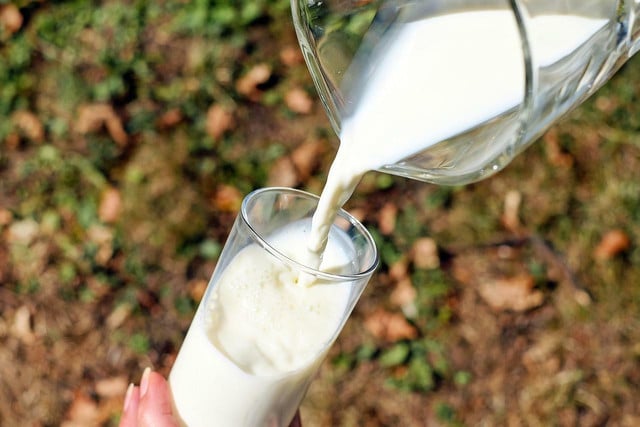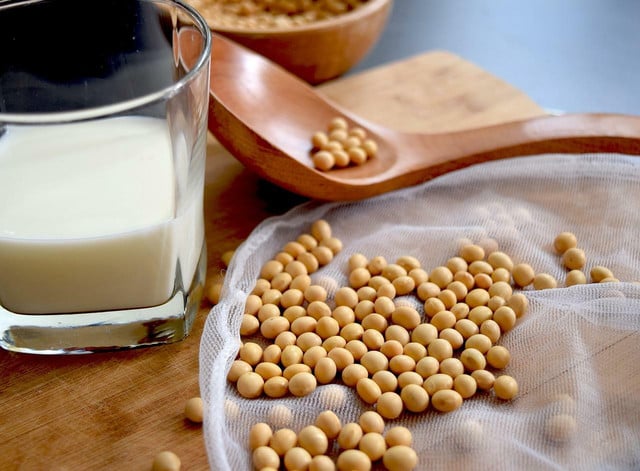A2 milk is easier to digest and causes less bloating than regular cow's milk, and can be better for people with lactose allergies. Read on to learn more about A2 milk benefits.
Milk is a great source of vitamins, protein and calcium, which strengthens bones and prevents osteoporosis. It also contains lactose, which is a good source of energy. However, many people are lactose intolerant or lactose sensitive and experience stomach problems ranging from discomfort and bloating to pain and diarrhea when they drink regular cow’s milk.
Although scientists were studying the differences between A1 and A2 milk as early as the 1990s, interest in the benefits of A2 milk really began to gain traction in New Zealand in the early 2000s. The composition of A2 milk makes it easier to digest than conventionally produced cow’s milk; therefore, people with lactose intolerance may be able to enjoy it without the uncomfortable side effects.
What Is A2 Milk?

(Foto: CC0 / Pixabay / Couleur)
Casein and whey are the two main proteins in cow’s milk, with a type of casein called beta-casein making up about 30% of the protein found therein. Beta-casein can be separated into two groups, A1 and A2, which are differentiated by a single amino acid.
A peptide called BCM-7, present in A1 milk, is responsible for the discomfort some people feel after drinking milk. Most cow’s milk available on the market today contains predominantly A1 proteins.
The protein content in A2 milk occurs naturally and comes from specific cow breeds, like Jerseys and Guernseys. DNA from cow hair can be analyzed to check that the milk those cows make will only contain the A2 protein; the finished product is similarly tested before it is packaged and sold.
A2 Milk Benefits
A2 milk contains a range of nutrients, including vitamins A, D and B12, calcium, potassium, protein and omega-3 fatty acids. These nutrients contribute to bone and teeth strength and muscle function, and they can also help lower blood pressure.
People with digestive issues may choose A2 milk because it causes less bloating and is easier to process, as our bodies are able to break its proteins fairly easily. Furthermore, studies show that people with lactose intolerance can drink A2 milk without the adverse side effects they experience from drinking A1 milk.
However, people who have problems with dairy as opposed to lactose feel similar levels of discomfort with both A1 and A2 milk varieties, so it may be best for them to stick to plant-based milk. Some good alternatives to traditional cow milk are listed below.
Plant-based Milk Alternatives



(Foto: CC0 / Pixabay / bigfatcat)
There are now many plant-based milk alternatives available for vegans or people with dairy sensitivities. They also taste great and are healthier for you and the environment.
- Soy milk: Of all plant-based milk varieties, the nutrition content of soy milk is the most similar to dairy-based alternatives. However, due to how soybeans are farmed, it is not the most eco-friendly option.
- Oat milk: This creamy, tasty option doesn’t contain lactose, cholesterol or soy and is also calcium-free. Store-bought oat milk may contain added sugar, so consider homemade oat milk instead.
- Potato milk: Potato milk contains vitamins A, C, D, E and K and has a low environmental impact. You can also make potato milk at home.
- Almond milk: Almond-based milk options have a creamy, slightly nutty flavor, are high in calcium and low in calories. However, keep in mind that although almonds have a relatively low carbon footprint, they take a significant amount of water to produce, so other choices may be more sustainable.
- Flaxseed milk: This plant-based milk doesn’t contain nuts or soy, making it an excellent choice for people with allergies. It also has vitamins A, B12 and D and can help manage obesity; however, its protein content is low.
Environmental Impact of Dairy Milk
While cow’s milk contains some beneficial nutrients, dairy milk production involves significant negative environmental impact, especially when compared to that of plant-based milks.
A massive amount of land and fresh water is used to rear dairy cattle; for example, producing one liter of dairy milk requires almost nine square meters of land, whereas almond milk needs just half a square meter to yield the same amount. Similarly, dairy milk production omits the highest levels of greenhouse gas emissions, at 3.2 kilograms per liter of milk produced, compared to only 0.7 kilograms per liter for almond milk.
When deciding on which milk is the best for you, take into consideration the environmental impact of your choice. Dairy milk is by far the least sustainable option available.
Read more:
- Is Almond Milk Vegan? Let’s Take a Look
- Best Vegan Substitutes for Evaporated Milk & How to Use Them
- Vegan vs. Vegetarian Diets: What are the Benefits and Differences?
Important Information regarding Health-related Topics.
** Links to retailers marked with ** or underlined orange are partially partner links: If you buy here, you actively support Utopia.org, because we will receive a small part of the sales proceeds. More info.Do you like this post?








